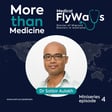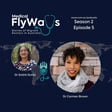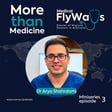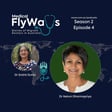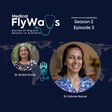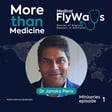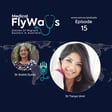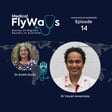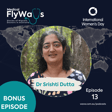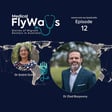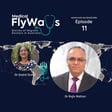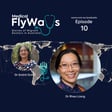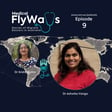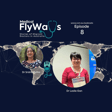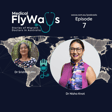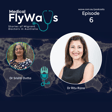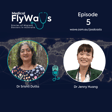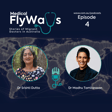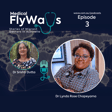Become a Creator today!Start creating today - Share your story with the world!
Start for free
00:00:00
00:00:01

More than Medicine: Episode 2 - Dr Humera Aaqib
From Pakistan to Perth: Dr Humera Aaqib shares her story of moving to Australia, landing a job as a GP, and pursuing her passion for photography.
Dr Humera Aaqib’s journey from Pakistan to Australia is one of challenge and change.
In this latest episode of Medical Flyways miniseries, More than Medicine, she talks to Dr Srishti Dutta about learning to embrace a new sense of freedom in Australia, building a community, and her deep love for photography as a creative escape to balance the demands of her medical career.
Recommended
Transcript
Introduction to Dr. Humaira Khanam
00:00:01
Speaker
Medical Flyaways, the untold journeys of migrant doctors in Australia.
00:00:13
Speaker
Hello, welcome back everyone. And today we have another awesome guest with us, Dr. Humaira Khanam, who is a GP and is currently in training, lives in Perth in WA.
00:00:25
Speaker
Before I came to Australia, the Australians I spoke to told me that WA was another country. So for my oral practical purposes, you're on the other side of this continent for me. ah Welcome Humaira and thank you for being here.
00:00:39
Speaker
Thank you so much for having me, Srisi. So my first introduction to Humira was, as for many of us, is through social media and on Facebook.
Passion for Photography
00:00:48
Speaker
And I remember seeing some of the most amazing photographs that she used to post of her work, mainly initially around nature and her garden, if I remember correctly.
00:01:00
Speaker
Yes, true. Flowers are most important because they don't fight with you. that Why are you asking to take my photos? Yes. unlike their own children. So yeah, nature. And obviously Australia has so much to offer. So, you know, wherever you go, I don't travel much, but even in the suburb, yeah, you can find a lot of beauty.
00:01:21
Speaker
I was going to ask you the other aspect of photography that you also do is food, because I remember that too. And some of your food creations that you photographed and shared about.
00:01:32
Speaker
So was that just a combination of two special interests or how did that land? So I love food. Initially, when we moved here, there were not many options in Perth for us to explore. So, you know, we we had like maybe few Indian restaurants and all of them tasted the same.
00:01:52
Speaker
When you are in another country, you miss your home, you miss your culture, you miss your food and everything. And I started experimenting with food. I wanted to eat things I missed.
00:02:03
Speaker
And then I started branching out. And when I looked at Insta and I was like, you know what? Oh, this looks good. Maybe I should start doing food photography because I'm already photographing flowers. And then there are seasons, for example, winters, you know, you can't really go out when it's rainy.
00:02:19
Speaker
And then COVID happened. So we were stuck indoors. Yeah. So everyone, you know, went on a journey to bake sourdough and, you know, you're learning about recipes, you're trying to utilize whatever is in your pantry.
00:02:33
Speaker
So that's when I started doing food photography. I still remember some of those photos. And of course, you've since shared photos of your lovely family as well that I've seen. So it's certainly an interest you're nurturing.
Charity and Cultural Exhibition
00:02:44
Speaker
Now, I also wanted you to share a little bit about the work where you had the opportunity to display and exhibit some of your work, because I saw it on social media. And I think that's one of the very accomplished academics in WA who supported that work as well.
00:03:01
Speaker
Yeah, Dr. Zarin Siddiqui is actually head of the Pakistanis in Australia organization. It's a non-for-profit. And at that time, Pakistan was affected with flood. And the exhibition was organized to raise funds for people who were affected by floods. So I got an opportunity to display some of my work.
00:03:19
Speaker
And luckily enough, I had some photos of a very culturally rich area of Pakistan that's Tata. And I think it's over 150 years old, the tombs and everything, the shrine where I visited.
00:03:35
Speaker
And I took photos of some of the people, what do you call them, you know, roadside vendors and the kids playing there. Still lives by the sound of it. It is. It is. so yeah, it was a good experience.
00:03:48
Speaker
So for those who can't see you because they won't be able to, you're smiling as you're talking about this. And I'm just kind of absorbing all that joy sitting here vicariously. I'm just traveling back to time.
00:03:59
Speaker
Yeah, I can see you kind of do that inside smile as well.
Therapeutic and Personal Growth through Photography
00:04:02
Speaker
So so what does photography mean for you? you know What would you like to share about what it does for you as an interest, as a passion?
00:04:10
Speaker
It started as an interest. It's actually a very funny story. You know, I've always been attached to camera. So my older brother, has since passed away. He had this old yashika, you know, this when you used to have this reel and then every family member had, you know, you had 32 photos and you can only get seven, you can only get six.
00:04:29
Speaker
And you had to wait for like a whole month for the film to develop. And then you can see the photos. Obviously, there was always this thing. When I'm old enough, I can hold his camera. I can take a photo kind of like thing, you know.
00:04:41
Speaker
And when i got married and i keep my husband, he spoke to me and he's like, oh, what do you want as a present? You know, should I get you a ring or a bracelet? And I said, camera. ah ah So I didn't know much about DSLRs. He didn't know much about DSLRs. So he just got me a point and shoot.
00:04:58
Speaker
And I was shooting everything right, left and center. And then I was getting frustrated because obviously you're not getting the results. It's not high definition. I don't know much about anything. I don't know much about lighting.
00:05:11
Speaker
And during that time, I had my oldest, she was eight or six months and I was walking around a shopping center and there was this pop-up stall which said free photo shoot. And I got excited. i was like, oh, you know what? I'll go to the free photo to shoot for my girl.
00:05:25
Speaker
went there. They took amazing photos of her. She smiled, you know, throughout the session. Throughout, obviously. Not for you, but she does for the cameraman, yeah? Not for me, but but she did, obviously. And it was such a fantastic experience seeing her smiling for the photos.
00:05:40
Speaker
Mind you, at that time, I wasn't working. He was the only breadwinner. We were very new to Australia. So we didn't have much money. and Okay. So I know, I think I know where this is headed. Keep going. Three weeks later, i get a call that your photos are ready. I went to the stall They were the most beautiful portraits of her and I could only afford one.
00:06:03
Speaker
She was selling the package of $800 that that's in 2013. So I had only one 15, my bank account and I paid her $99 to get one portrait. I still have that.
00:06:15
Speaker
That just triggered something in me. And i was like, you know what? I have her. She is the most beautiful subject. Um, I'm going to learn. So I started saving and I started researching and I came across some free online courses and then some paid online courses.
00:06:31
Speaker
And then it was from, you know, started with her photos and then, you know, photo of this thing, photos of that thing. And then I visited Pakistan and, you know, during all this a couple of times.
00:06:44
Speaker
And then I took photos of my family and then I went to this but historical place. I told you about Tata and I took some photos there. you know, it just started from there. One thing led to another.
00:06:55
Speaker
So that's how i got into it And now I feel like when I get frustrated, this is like an outlet for me. If nothing makes sense, I cannot control anything. This is something I can control.
00:07:09
Speaker
So cooking, photography, you know, capturing these things, I can always revisit them later. Depends on my mood as well. If I'm feeling down in the tramps or nothing's making sense, I can go and shoot dead flowers because I want to find beauty in...
00:07:26
Speaker
the textured leaves, that not everything has to be bright and, you know, sunny. You don't always have to be happy or cheery. So that's how I got into it.
00:07:38
Speaker
I'm just sitting here absorbing it. I'm just like blown away by how you've described that. It absolutely makes sense. And that positive meaning making journey, which strangely enough, i I've heard that phrase in ah in a very different academic setting.
00:07:52
Speaker
And I've been a muse for my other half, who is the photographer in this household. And so I know being a muse is not easy either, just saying. Yeah, true. So what, like, I think there's there's a little segue here that I'm going to take, which is your life partner. and And obviously he had a contribution to make in this regard in terms of your interests and hobbies.
00:08:13
Speaker
And I know he's allowed you to photograph him once. I remember that photo that you shared as well. So what does he think of, you know, you having this part of life that you cherish, you value, you nurture it from what I've heard?
00:08:28
Speaker
I think like that's me thinking ah he he's always been supportive. He always enjoys. Sometimes he doesn't even look at my photos and he's like, yeah, great. Fantastic. You know how husbands do. And sometimes so for him, the most important thing is our girls. I don't share their photos much on social media now, but for him, the memories he can revisit, he keeps going back to the memories. His father has since passed away, but they visited us. So he's got a lot of his photos with the girls, his mother's photos with the girls.
00:08:58
Speaker
So he can always revisit and he can relive that moment. So he enjoys that aspect. Whenever we go out, I am kind of like a paparazzi in our family. Oh, I love that. I know.
00:09:10
Speaker
So I keep, which which frustrates me to the point as well that I don't have any photos with a dog. Photos of the photographer, yes. Yeah, but I'm training my 11-year-old now. She can have my second camera. So she, this is something she's expressed interest in.
00:09:25
Speaker
So I ask her, you know, this is how you can do. You don't always have to look and smile at the camera. So when we come back every time, because he says that he's soaking the view, but when we come back, he looks at the photos of the girls and he enjoys that vacation again.
00:09:40
Speaker
That time again, by looking at their expressions that, oh this is what they were doing. This is what I was doing. Okay, fine. So he doesn't enjoy me getting up early if I want to catch a sunrise or dragging him one and a half hour drive away if I want to catch a specific, you know, spot.
00:09:58
Speaker
Yeah, it's fascinating though, that You've just triggered a memory for me. My husband and I, before we came to Australia, so I have relatives in Australia, they were visiting and they were going to be in Rome. And I said to him, look, it'll be great. Why don't we take a holiday? Because we've never been there. And who knows if we'll be able to come all the way back to Europe to see some of these places once we've moved.
00:10:17
Speaker
So we went to Rome and my older one was quite young then. So I said to him, I want to take some photos of the markets. And I'm not the photographer, as I've said already. But I just, it was just such a culturally rich place. I wanted to absorb some of that.
00:10:32
Speaker
And so I woke up, like you've described, i have I don't do this normally. It was just a holiday thing for me, to be very precise. And I remember taking his camera, because it was all his equipment, and walking down the streets in the room. I woke up at five and I went there took photos of them setting up the markets and i just I think at that stage, though, I just wanted some me time, you know, being a mom of a young person and just feeling caught up.
00:11:00
Speaker
And I remember him saying, yeah, that's fine. As long as you're not asking me to get up and for me and the young one to come, you can do it. Go and do it. Have your space. So it sounds like it's a little protected space for you as well.
00:11:12
Speaker
is. It is. Because as I said, when nothing else is making sense and, you know, It's just you, your camera. And for some reason, my brain actually shuts everything off.
00:11:25
Speaker
So I'm just focusing on the subject. And it's very grounding as well. And if you look at some of the flowers I've taken photo of, a little bit of a yoga there to get to that perspective. Sometimes you have to lie down. Sometimes you have to bend down.
00:11:41
Speaker
you know You know, you can't always have a zoom lens. So sometimes you just have to zoom in and out with your body. So he used to get really flustered with what you are doing in a public space. People will think you are crazy.
00:11:55
Speaker
But now he's just so used to that he's, you know, even if someone stops, he's like, she's fine. She's fine. She's just taking a photo.
00:12:04
Speaker
So, yeah, there have been instances when I just take my camera and I was like, I just need 10 minutes with my camera. And he understands that whether it's the sunset or, you know, it's a rainy day or whatever. I just leave the house.
00:12:16
Speaker
This is just a me time. the world through my lens, whatever I see. And then I can always revisit that photo later and then edit it accordingly. So I don't do Photoshop, but I do edit some of the colors and things in Lightroom.
00:12:31
Speaker
So yeah, I think it's a very controlled sort of like, you know, therapeutic process for me. You know, when you described that initial bit, I remember hearing on a podcast about flow states.
00:12:43
Speaker
It's yoga-like, as in you kind of, this is, I can't remember. I think ah there was somebody who said, it they're athletes that run, that sprint. So, you know, like I'm thinking about Usain Bolt, but there are others.
00:12:54
Speaker
they describe what they call flow state, which is actually exactly as you said, it's a psychological state where you just describe it, you know, the world, your brain shuts everything out. So you're just in that moment and there's some, so it clearly does that for you. And you've probably, how long have you been doing it? Just out of curiosity, what what kind of practice or learning has has gone into it to be where you are?
00:13:20
Speaker
So the serious aspects of photography, you know, after getting my first DSLR, I think it all started in 2014 or 2015. So fair fair bit of time and then learning the equipment. And then, you know, as you mature and you get more financially relaxed and I started working, you know, I got, I landed my first job in Australia as a doctor in 2017 So with that money, obviously, i treated myself with a new camera and lens. Yay, yay, yay.
00:13:51
Speaker
And every three or six months, I would treat myself with the lens because, you know, every time, you know end of term, I need something new. That's awesome. It it was really good. And also when you start, you know, something new, you don't really know what area you will enjoy ah will be practical. So like, I would love to take photos of streets, market, urban photography and sunsets and so sunrises, but it's not practical as a mother of young kids.
00:14:22
Speaker
So what's the plan B? I don't want to let this go. So let, you know, here comes the food and flowers. So I started growing flowers, not getting very successful there.
00:14:33
Speaker
But then I started looking, you know, you don't have to go very far. We are so lucky that even in suburbia, you can find something on the roadside. So, yeah, that's how, you know, it
Journey into General Practice
00:14:44
Speaker
transitions. So by i have collected a lot of equipment, which I now need to get rid of.
00:14:49
Speaker
I will sell it eventually one day. But then you find your piece that this is what I can do. And this is what I cannot. And this is maybe I will do it, you know, at some point in life.
00:15:03
Speaker
I mean, I think hearing you speak about this is reminding me of some of the lessons my coach has given me, which is progress over perfection. You know, also that old theory we have of what's in your control and what's not ah in your control.
00:15:17
Speaker
Like how much of those things have you applied to your life as a migrant doctor, as someone who came and started studying here? I think a lot. And some of the things are not by choice, I would say.
00:15:32
Speaker
So I'd say maybe it's just me, but I feel like we don't have many options here for doctors to work. Or maybe I don't know much about those fields.
00:15:43
Speaker
Like, for example, when I was in Pakistan, so my background, I'm from Pakistan. There are options that you can do, and I'm feeling anatomy, you know, and you can stay in that field. You can work in biochemistry. So there were many more non-clinical roles you can do as a doctor.
00:15:59
Speaker
So yeah, this kind of like what you can and what you cannot do, i think it translated into my life to the point that now I'm doing general practice. And I don't hate it. I like it because it's fulfilling. And it's as a GP, you'll know that it's not just a clinical medicine.
00:16:17
Speaker
It's relational medicine. Yeah, it is not your traditional medicine. There's a lot you do in general practice. So I would say that it did translate in my professional life as well.
00:16:29
Speaker
So in terms of non-clinical academic careers is probably what you were describing. um And they're still very much in the science back field. And some of them are, as you said, academic. I think i hear what you're saying is when you come over to work here, the accessible part to begin with is clinical medicine because that is where the need is.
00:16:52
Speaker
Or it's you know perceived as being the area of need within the training level. domain or maybe even after that, do you feel that's something that you might consider looking at?
00:17:03
Speaker
I mean, I guess that's, as you said, strategically, if that means you have to go and do a PhD, I'm not sure you'll necessarily want to opt for that. No. Yeah, exactly. Right. So, so yeah.
00:17:17
Speaker
Look, I'm very much go with the flow kind of like person. I don't plan. I don't know whether it's a good thing or a bad thing, but this is just me. I don't plan far ahead that this is what my life will be in five years.
00:17:30
Speaker
Who knows? So that might be an option. I might see you then. I do agree. The one question I used really dislike ah in the past was when someone asked me, what's your 10-year plan? And I used to usually say, I don't have one. So I've done okay, I think, as you have. So never had a 10-year plan, but...
00:17:45
Speaker
ah Maybe as we get older, I don't know, you know, who may i maybe i when I'm 60, I'll have a 10-year plan. It might be worthwhile thinking of it then. I'll have a 10-minute plan if you want to ask about it, but that's how far I'll go.
00:18:00
Speaker
ah Now, in terms of ah previous experiences that you had, and this is more in the medical domain, I'm asking, were there things you did in Pakistan that was during your training or after that you have been able to apply or extend or use those skills here so far?
00:18:18
Speaker
I only did my internship in Pakistan and I moved here. So it was, I didn't really have that experience back home because internship is basically a survival mode. Yes, that's true.
00:18:30
Speaker
Yep.
Adapting to Australian Culture
00:18:31
Speaker
And it's such a long time as well. So you see, interesting. So obviously the additional construct of that is obviously had the training and the clinical skills that you brought with you, which are still very valuable.
00:18:43
Speaker
Are there elements of that that's been helpful here in that transition? Yeah, I would say communication because... When I was in Pakistan during my med school, I did my med school in a remote area.
00:18:54
Speaker
I had to learn. So I can speak three languages. But when I was doing that, ah medicine, you know, medicine in Namibshas, it's like one of the peripheral area. So I had to learn another language, which I knew, but I couldn't speak fluently.
00:19:09
Speaker
So Sindhi. So I had to learn Sindhi. So you learn a new thing. You try to interact with people. so I was born and raised in Sindh, but not in a very rich Sindhi area, if it makes sense. Yes, culturally there are differences. yeah Yeah.
00:19:24
Speaker
So when you go to a regional area, you have to learn a little bit more about the culture, a little bit more about people, how they are living, how they are living. And when I moved to Australia, that was really important that you learn about the different set of population here because we are a rich multicultural country here.
00:19:43
Speaker
a lot of languages, a lot of cultures. So I think that bit helped me that I was not very dead set that this is what I'm going to get in my practice. So I was able to connect with people from all sorts of but backgrounds.
00:19:56
Speaker
And I think my main strength as a clinician is communication. I completely understand where you're coming from. Now, next question on that, because this is an area that I feel very passionately about as well, having been around the world, so as I call it.
00:20:11
Speaker
You mentioned language. And yes, you know, growing up in South Asia, we're very familiar with multicultural, multilinguist societies. we I mean, in some ways, I i was i moved to monoculture and mono language you know single language and found that really...
00:20:28
Speaker
easy in some ways because, you know, you think you don't have to make an effort about so many other things, right? And it's interesting because you've done that transition twice then, once within, you know, your country of birth and now to the country where you've chosen to live.
00:20:42
Speaker
What are the elements in the communication that are more than just knowing the language? Are there things that you feel, ah because we often, you know, simplify it down to language, but it's communication is so much more than that, right?
00:20:54
Speaker
No, so I think it was a cultural shock coming here for me. I'm not from a very conservative family, but I'm from a conservative area, if it makes sense. You're not from a city.
00:21:06
Speaker
Yeah, I'm not from a very big city. It was like a town. So I used to travel independently. I didn't have to wait for my father or my brother or someone else to, you know, take me there or there.
00:21:17
Speaker
We had this luxury and trust that we could travel. But after coming here, everything you have to do on your own, ah we don't really understand that It actually comes across as a very, very big shock initially.
00:21:32
Speaker
And it's very, it sounds very silly and it sounds very privileged. I had to learn how to live independently. Yeah, no, I mean, it's since you're very humble calling it a privilege, but I think if you, I have thought that too, is that if you live in a country where your physical safety is almost guaranteed, you have not considered that as an element in terms of how you move, you can achieve that level of independence immediately.
00:22:03
Speaker
far more organically you don't have to whereas what you're saying is that there's a level of not feeling safe which kind of makes you stop and think so when you came here you had to learn to use that freedom that you got I had to and I had to learn to live by myself and be comfortable with my own company which is not something I learned back home because you're never alone There is always someone in the house with you you. You are just never alone.
00:22:34
Speaker
And that living by yourself, we didn't have much when we moved here. I was not working. I didn't have many friends here. So all the friends I had were thanks to Facebook. So I'll give Mark that.
00:22:48
Speaker
And i found many friends through AMC platform. So that's and another interesting bit that, you know, all my friends, unconsciously were either because of photography or because of medical field, because I didn't know how else to connect to people, how else to connect with my neighbors.
00:23:06
Speaker
This is a skill you learn over time. And I still haven't mastered, even though I'm very, you know, extrovert as other people would say, but I still, it it is a bit hard for me to go and strike a conversation with a random person.
00:23:21
Speaker
So just living by yourself You know, being self-sufficient, this is something which I learned here. And i had to use this in the job setting as well when I was working, that you have to do everything by yourself.
00:23:36
Speaker
You are the only person you can go to if you need some problem to be solved, if it makes sense. It's an interesting, seeking help and receiving help aren't always aligned is what I'll say to that. So I hope that eventually they will, and I'm sure you already have people that you feel comfortable seeking help from. But as you're saying, the level of autonomy that you're given, you start using that more and more.
00:24:04
Speaker
to learn and find what you what you need. So in terms of work, obviously you so you're still in training. Are there particular signposts you want to get the exams done? That's definitely an aspiration.
00:24:17
Speaker
But other than that, are there any other aspirations from a work perspective at the moment? Or what are you planning with your GP work in short? So yeah, exams.
00:24:28
Speaker
Yes, get them out of the way. Yes. So ah as we were discussing before the podcast, as I said, I'm part-time most of the time and I don't see myself going full-time in future.
00:24:39
Speaker
But maybe i will, maybe, um who knows, that maybe I'll go with tutoring. I think this is something i I'm really good at. But the level of prep which goes, I don't know whether I'm committed to that right now.
00:24:54
Speaker
Yes, in terms of helping others that have... Yeah, but most likely teaching is something which I think, because it comes naturally, I've come from a family, all my three sisters are teachers. So yeah, this is something um I'd be interested in.
00:25:08
Speaker
So have you found, you know, the AMC group that you mentioned, so that's referring to when we when people first get here, you know, so connecting with people through Facebook, that's an experience I certainly utilize to its best benefit in Australia as well. And and potentially there were groups that helped and enabled that for us in in general.
00:25:28
Speaker
Beyond that, from a social construct, and AMC, as you said, was again another professional group. Photography was more hobby-related. Socially, what are the connections and networks? or like what are those What do those look like for people that for what you opted into, let me say it that way?
00:25:47
Speaker
Social connections, I think they forge slowly because when you move to a new continent, the language and everything, it's much more than language, as you as you mentioned earlier. The other aspects as well, yes. Other aspects as well.
00:26:01
Speaker
So finding someone who shares, your but because this is really important for us, that we don't want to meet people who don't share our vision in life so it doesn't really mean that we are only restricted to people from Pakistan I do have some friends from India I do have some late ah you know local Australian friends as well but then once you're older i haven't done my schooling here i haven't done my basic you know medical degree here it gets really hard to find friends After a certain age and especially as a family.
00:26:34
Speaker
So other friends, I think, are from children's school. Yes. Moms groups. Yes. Moms groups and medical moms groups, to be honest. Like they don't have to be GP, but they're doctors. so um he know Because my husband's not very social.
00:26:49
Speaker
ah He's got only one friend in life and that's me. I don't know whether this is something good or not.
00:26:56
Speaker
Well, he knows what he wants. I will give him that. He knew what he wanted and he's achieved it. He knew. And he's so content with it that I get, sometimes I get very flustered that, you know, why you don't seek out that external validation. but no, just kidding.
00:27:11
Speaker
ah That, yeah, I always go out and, you know, I always find people to talk to. But initially I had many friends. I still have. But then as you grow older, you you find that, you know, it's much more about connection.
00:27:26
Speaker
what you are getting out of that friendship. It doesn't have to be very, you know, something very big, but just like how you feel after talking to them, how you feel before talking to them, you know, that anticipatory anxiousness, anxiety. So this is something which I'm still working on.
00:27:45
Speaker
But it sounds like you have those connections though from the way you've described them. Oh, I do. Yeah, i'm I'm lucky. I'm really privileged that, you know, lucky as well that I found some really good set of friends here.
00:27:57
Speaker
Now, I'm going to ask this from the point of view of you've had ah some experience in other representative roles and, you know, thinking about your experience in terms of being a doctor who came here and worked here. if there was something you wanted to change, any one thing,
00:28:14
Speaker
what would you consider would make a an impact or a difference to those who come and work here and train here? um Is there something you think that you see as some as achievable and that you might consider putting in or throwing in as a suggestion for change? Yeah.
00:28:32
Speaker
That's a very important question. I don't know whether we'll be able to achieve that or not. I think the most important thing would be for, and some of the hospitals are already doing this in WA, I'm not sure about other states, to have a streamlined bridging program.
00:28:48
Speaker
Like, you know, one of the hospital here is providing observership for two months to IMGs, which is unpaid, obviously. But that observership leads to a job or leads to something, whether it's WBA or whether it's after clinical exam. I think we need to have those structured kind of like places where they can go rather than just applying everywhere randomly.
00:29:11
Speaker
Maybe like a bridging program or something, which is approved or accepted by APRA. Because when you come here, the information, everyone has their own bits to share. Everyone has to pass exams. So I'm talking about people who are coming from the countries where they're not already recognized. So you have to do AMC.
00:29:31
Speaker
So there there's a bit of a barrier and you have to complete AMC and APRA doesn't like when you don't have ah when when you have a huge gap in your resume. Recency is an issue. So how are you going to get recency when your whole life is here?
00:29:45
Speaker
You know, so leaving your whole life here and going back to the country of birth or country of education, it's not always easy and practical for everyone. Absolutely right. And it's interesting you bring it up because I was in conversation with a doctor in Melbourne who was trying to support somebody.
00:29:59
Speaker
And the issue there was not just recency, but that the country they have come from is a country where there's conflict. And they cannot physically provide the information that's required.
00:30:14
Speaker
And it's just a question of if they if the medical school that they studied in is in the middle of a conflict zone, I mean, that recency, there's there's no way to achieve that, as you said. Yeah.
00:30:26
Speaker
And some people can't even get their paperwork or paperwork verified. So where to go from there? Yeah. but That's a very, and but mean, I agree with you, but that it's achievable or not is not in our hands, your and mine.
00:30:38
Speaker
But it certainly is a very, it is a solution that can be considered in the framework of things. So thank you for sharing that. I hope that remains on your agenda for future endeavors.
00:30:49
Speaker
Don't walk away with a list because I'm very good at making lists. So I'll put it out there. Now, one of the things we do, and I've loved doing this, what I call ah random walk in the garden with you of going around topics and picking and and choosing as we've gone along.
00:31:06
Speaker
How do you balance being a mom, a doctor and an artist at the same time? The answer is I don't. Okay. You're not seeking perfection. I hear you. No. So I don't try to balance.
Balancing Family, Work, and Hobbies
00:31:21
Speaker
I have a very, you know, being a mother is the highest thing on prior, you know, highest on my priority list. So family comes first and then job, because obviously we all have bills to pay and then photography.
00:31:36
Speaker
So, and it took me years to get to that point. Previously, my order was all wrong. I wanted to take that photo, you know, but now I've learned that's okay. That's not my frame.
00:31:48
Speaker
I can move on and I can do something else. And I'm not a traditional housewife. So if you knock on my door without any notice, you may not approve of how I live and the state of my household because we live here.
00:32:03
Speaker
So keeping my house tidy and pristine is not number one priority. So I've learned to live with this, that, you know, kids should be happy, not happy all the time, obviously, you know, it's not psychologically healthy. prepared for is my But, you know, they then they need to be safe. They need to feel safe.
00:32:23
Speaker
So i I don't seek perfection because I know I can never achieve that. I just do what's most important task in front of me. What do I need to do? And yes, obviously, if I have exams upcoming or scheduled, then I need to set priorities that this is something which we will need to do.
00:32:40
Speaker
But I give myself some flexibility. Like, for example, if I want to study on this day, it doesn't have to be in one sitting. For example, on Monday, I want to study for four hours. It can be spread out, you know, an hour this time, an hour that time.
00:32:55
Speaker
and After being a mother, i think our brain kind of like adapts to this thing that you you you learn to live with the flow. So, yeah, it it's been working so far.
00:33:06
Speaker
The unpredictability of having a child. Yes, absolutely. You don't know what what you will face. you know you but You can plan all you want, but... yeah There's always going to be something else that at There's always going something else which is, you know, way more important and yeah unavoidable, I'd say.
00:33:24
Speaker
I agree.
Rapid-Fire Round: Identity and Legacy
00:33:25
Speaker
So one of the things I do at the end of the podcast is called a rapid fire. So I throw three words at you and the guest has to answer with anything, a word, another sentence, any things you think about. So I'm going to start with the first one, which is almost always the same, i am g IMG, I would say the best doctor you'll ever get. Awesome.
00:33:50
Speaker
The second one is artist. The one who feels. And makes others feel? Yeah. Like artist perceptive and how other people will feel. Like what I am feeling, others may not feel the same thing.
00:34:06
Speaker
But they will feel, right? But they will feel. Yeah. Yeah, you know, all art makes us feel, I mean, again, conversation I had with my daughter, and i I don't call myself the artist, just point to note. so And third one, have to refrain from me adding things, is legacy.
00:34:22
Speaker
Legacy. Ah, that's a bit of a hard one. I didn't want to make it easy for you. Yeah. Legacy, I'd say it's not something material you leave behind.
00:34:35
Speaker
It could be anything. It could be a good memory, hopefully. Yeah, not not not material, not material things. Awesome. I will say something here that I have a colleague I work with um in one of the places and he said something to me.
00:34:51
Speaker
This is in defense of me having made it a little bit hard for you, is that you'll never know what you get from someone unless you challenge them. So that last one I threw in because I knew you would say something that I would value and I appreciate that. So thank you for that.
00:35:05
Speaker
but Thank you, for because it you know now it will keep me awake for a couple of days. There you Conversations help both of us in terms of that. yeah I asked you that question because when you gave me the order when you said the order of things and having changed them, it often has happens when you are very aware of the finiteness of your presence on this earth. i but Absolutely. Absolutely.
00:35:31
Speaker
So yeah, I think that will be something non-material and I'm sure you've already created memories, feelings and insights for others and shared so much today. Thank you so much, Omera.
00:35:42
Speaker
Thank you so much for having me. Thank you for having listened to this episode of Medical Flyways. I hope you've enjoyed this episode and will return for future ones as well.
00:35:53
Speaker
We would like to give you the opportunity to nominate a guest or any person you feel who is a suitable guest and who may have inspired you in your workplace or journey.
00:36:06
Speaker
So please leave us a comment and we will attempt to invite them to our podcast.
